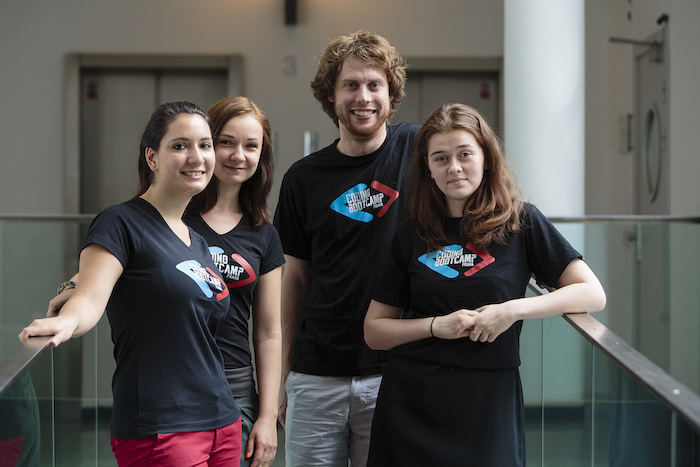After graduating from Coding Bootcamp Praha in 2017, Daria Grudzien had a second chance to start her career - this time as a Junior Site Reliability Engineer at Apiary. She blended her past work experience related to communication, business development and leadership with her new learnings from the world of web development and software engineering. Here are Daria’s main tips to help you be more efficient at navigating your work as a junior in the industry.
Look for solutions to your problems
There is a large difference between how a senior and junior engineers approach seeing a new error. While newbies hit a wall, seniors usually say “Interesting, I haven’t seen this one before” and copy paste the error message into Google. Searching the internet for solutions to your problems will need to become your top skill.
Most of the issues have been resolved before - it’s just a matter of formulating questions the right way, and understanding the answer. The ability to understand documentation, Stackoverflow answers, navigate contradictory tutorials - those will all improve as you practice.
Come With Specific Help Requests
Having said that, sometimes your senior colleagues will take 5 minutes to solve a problem it would take you 5 days to figure out. Balance out to know when it’s time to ask for help. When you do ask, try to formulate the problem as clearly as possible and show how you tried to solve it yourself.
Explain what search terms you googled for, what articles you found, what commands you tried to execute - show your colleague you’ve put a decent effort into solving your own problem, and share the findings - perhaps they will understand that obscure forum post you found.

Daria during her studies at Coding Bootcamp Praha
Own Your Work
Most companies define a junior position as someone who needs moderate help from other colleagues to finish the task. Ultimately, however, it doesn’t matter how much time that senior developer spent explaining the possible solution to you - you are the owner of your task.
It is your responsibility to finish it, even if you feel like half of it was rewritten by your colleague during a code review. It also means updating your team lead on your progress and obstacles, observing deadlines, asking the right person for mentoring on your task - everything until the task is verified as done by your team lead.
Even as a junior, it is your responsibility to make sure your task gets done.
Make Explicit Communication Agreements
Start your cooperation with the mentor who is supervising you on the task by asking about their communication preferences, and then respect those. They may want to see all your work summarized in a pull request, they may ask for a message in a team Slack channel when you get stuck or they may prefer if you show up by their desk when the task is urgent and you’re having problems. Figure out what works for them - this will help you be respectful to their own work, and in turn your colleagues will be more willing to help with yours.
Give Back
Chances are your first job in development will not be your first job ever. In most roles there is something unique you can learn, which can then be transferred into your new career. Perhaps you have experience in project coordination and management. Or you’re an expert on Google Analytics after optimizing dozens of PPC campaigns. Maybe you worked in customer support and know how to help users fast.
Whatever it is you did, there’s a good chance your team could use those competences. Helping out in those areas is a great way to contribute to your team’s work and to a certain degree repay your mentors for the time they generously spent explaining the meanders of programming. Make sure to stay on course and progress with your technical learning, though, without slipping into your previous career.
Utilise your previous skills and give back to your new team.
Keep Your Impostor Syndrome In Check
While there is a lot of talk in the community about the impostor syndrome, you may be more susceptible to decline in your sense of self-worth and self-esteem when spending days on end getting stuck seeing new types of errors every few minutes. Practice self-care to make sure you have enough energy to get going no matter how rough it gets.
Make a list of things you’re really good at, both in your personal and professional life, and look at it every time you want to yell at yourself and say something mean or judgmental. Put effort into spending your free time doing something you enjoy, that gives you a feeling of competence, with people you feel comfortable with.
Look at yourself from a third person perspective and talk to yourself like you would to your best friend - be real, but be kind and supportive. Appreciate that what you’re doing is hard, takes a lot of courage and is remarkable - you deserve the credit for that.

Daria during her studies at Coding Bootcamp Praha
Summary
Going all-in on your life and starting a new career is a very brave thing to do - particularly in a field that requires as much constant learning as web development and software engineering. By making sure that you build good habits early on you can speed up your progress and enjoy every moment of it. Good luck in your new adventure!
Be ambitious but be realistic. What you're doing is hard, so practice self-care. Make sure you enjoy every moment of the journey!
---
Daria Grudzien works as a Site Reliability Engineer. She holds a Master’s degree in Cognitive Science. After working in various roles, from selling custom software solutions in Hungary to teaching Psychology of Communication at a university in Indonesia, she decided to go through Coding Bootcamp Praha and go into tech. She was shown how to write a web scraper and fell in love with CLIs. Currently she is working on sharing her experience and knowledge with junior colleagues on her blog. This article is a shorter spin-off of her blog article at dariagrudzien.com: "Managing Self As A Junior - How To Decrease The Load on Your Team".